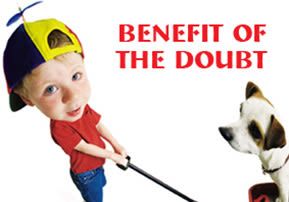
Benefit of the Doubt
Many things in our lives irritate us if we don’t look for a favorable explanation for all that happens; our interpretation of events dictates our feelings…

The Pressure-Cooker Lifestyle, Part 9
We’ve talked about finding mitigating reasons for someone’s bad behavior but we’re now taking this a step further. This point talks about working on judging others favorably all the time.
Many things happen in our lives that irritate us and the trick is to look for a favorable explanation for all that happens, because in reality it is our interpretation of events that dictate our feelings and how we behave towards other people.
We can, for instance “see” that our neighbor was very rushed and preoccupied and didn’t notice us when she passed by without greeting us, instead of “deciding” that it was very rude of her not to acknowledge us.
Even from this small example you can see how your thoughts dictate your mood, because of course you were in a far better mood when you chose to excuse your neighbor rather than vilify her; (and most probably she really was in a rush). What we’re talking about here is seeing the good in people and situations and not the bad.
Let me give you another example of what it means to judge someone favorably.
I desperately needed a few tins of tomato paste for a recipe I was experimenting with and as I was unable to leave the house asked a close friend who was going down to the shops to buy some. My friend happily agreed and I gave her the money, relieved that I would soon be able to continue with my cooking.
I waited…. and waited….. and waited, and my friend didn’t return. After a while I began to get annoyed because I had emphasized that I couldn’t continue cooking without that tomato paste.
Rather than allow myself to get angry I decided to switch tracks and try to find a good reason why no tomato paste was forthcoming. And what I decided was that perhaps one of my friend’s children had stopped her from going out, or someone had fallen ill and she couldn’t leave the house – things that happen all too often. (And of course as soon as I found a valid reason for her not being able to go out I calmed down).
As time passed and it became clear that I wouldn’t be seeing anything resembling tomato paste so soon I substituted an alternative whilst mentally making a note to phone my friend later and see if anything had happened to her.
Imagine my feelings when two hours later my friend phoned me with the following story.
She had indeed left the house at the time she had planned to and gone down to the shops. Unfortunately they were completely out of stock of that particular brand of tomato paste, so she had gone to THREE – yes – THREE other shops in the area trying to locate what I wanted. (That’s what usually happens here; when something’s out of stock none of the shops have that item until a new supply arrives).
In the end, she HAD found a few tins and she asked me to send someone round to her to fetch them. She explained that she’d been out of the house for far longer than she’d originally planned and couldn’t go out again to bring them to me.
Imagine my feelings: I had been ready to condemn her for her unreliability, but Boruch Hashem had managed to avoid doing so. I was comforted by the fact that I had at least thought of a good reason for her “not managing” to buy my tomato paste. Imagine what I would have felt like if I had allowed myself to get angry at her “untrustworthiness”!
(And just in case you want to know the recipe really did need the tomato paste, so that my experiment failed that day).
Small incidents like that happen all the time and we can really become aggravated if we choose to see everything that doesn’t work out quite the way we want in a bad light. And I deliberately use the word “choose” because as you can see from the two examples above you do have the choice to see the “good” or the “bad” – and what is very clear is that our “choice ” is critical to our anger-level.
Think about it: Isn’t it frightening to see how much we are at the mercy of our thoughts?
If you look at a person positively and see their actions as benevolent as opposed to malevolent you will even be able to deal with difficult people because you will feel kindly towards them.
Once again I must tell you that this a tried and tested method which has changed many people’s lives, and even though in the beginning you might feel that your “rosy interpretation” is not true with time you will prove to yourself that it is correct. Klal Yisroel are not intrinsically bad or vengeful and they really do want to be good and help each other. Unfortunately other people’s view of what is good and helpful is not always the same as yours which can lead you to feel that life is difficult and people are uncooperative (if not downright obstructive).
But if you do give people the benefit of the doubt life will be much calmer and more peaceful; isn’t it more pleasant to see our people as the sons and daughters of The King that they really are?
To be continued.













Tell us what you think!
Thank you for your comment!
It will be published after approval by the Editor.